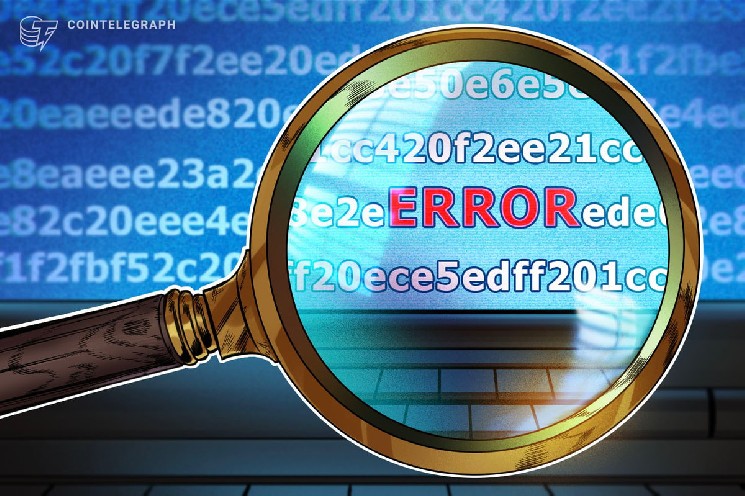OpenSea patches vulnerability that potentially exposed users’ identities

Nonfungible token (NFT) marketplace OpenSea has reportedly patched a vulnerability that, if exploited, could expose identifying information about its anonymous users.
In a Mar. 9 blog, cybersecurity firm Imperva detailed how it discovered the vulnerability which it claimed could deanonymize OpenSea users “by linking an IP address, a browser session, or an email in certain conditions” to an NFT.
As the NFT corresponds to a cryptocurrency wallet address, a user’s real identity could be revealed from the information gathered and linked to the wallet and its activity, explained Imperva.
Imperva Red Team discovered a cross-site search vulnerability affecting the #NFT marketplace #OpenSea.
This vulnerability allows for the deanonymization of users, potentially revealing a user’s identity. https://t.co/nGQWceeGEc
— Imperva (@Imperva) March 9, 2023
The exploit is understood to have taken advantage of a cross-site search vulnerability. Imperva claimed OpenSea had misconfigured a library that resizes webpage elements that load HTML content from elsewhere which are typically used to place ads, interactive content, or embedded videos.
As OpenSea didn’t restrict this library’s communications, exploiters could use the information it broadcasts as an “oracle” to narrow down when searches return no results as the webpage would be smaller.
Imperva detailed that an attacker would send their target a link through email or SMS which if clicked “reveals valuable information, such as the target’s IP address, user agent, device details, and software versions.”

Screenshot of OpenSea’s front page. Source: OpenSea
The attacker would then use OpenSea’s vulnerability to extract the NFT names of their target and associate the corresponding wallet address with identifying information such as an email or phone number which was sent the original link.
Imperva said OpenSea “quickly addressed the issue” and properly restricted the library’s communications and reported the platform “was no longer at risk of such attacks.”
Users of the platform have long been victims of attacks that mimic OpenSea’s functions to undertake exploits, such as phishing websites that resemble the platform or signature requests appearing to originate from OpenSea.
OpenSea itself has faced criticism for its platform security due to a major phishing attack in February 2022 that resulted in over $1.7 million worth of NFTs being stolen from users.
As for the recent patch, it’s unknown how long it existed or if any users had been affected by the exploit.
OpenSea did not immediately respond to Cointelegraph’s request for comment.






 Bitcoin
Bitcoin  Ethereum
Ethereum  Tether
Tether  USDC
USDC  TRON
TRON  Dogecoin
Dogecoin  Cardano
Cardano  Bitcoin Cash
Bitcoin Cash  Monero
Monero  Chainlink
Chainlink  LEO Token
LEO Token  Stellar
Stellar  Zcash
Zcash  Litecoin
Litecoin  Hedera
Hedera  Dai
Dai  Cronos
Cronos  OKB
OKB  Tether Gold
Tether Gold  Ethereum Classic
Ethereum Classic  KuCoin
KuCoin  Cosmos Hub
Cosmos Hub  Gate
Gate  Algorand
Algorand  Dash
Dash  VeChain
VeChain  Tezos
Tezos  Stacks
Stacks  TrueUSD
TrueUSD  Decred
Decred  IOTA
IOTA  Theta Network
Theta Network  Basic Attention
Basic Attention  NEO
NEO  Synthetix
Synthetix  Qtum
Qtum  0x Protocol
0x Protocol  Ravencoin
Ravencoin  Zilliqa
Zilliqa  DigiByte
DigiByte  Nano
Nano  Siacoin
Siacoin  Numeraire
Numeraire  Waves
Waves  Ontology
Ontology  Status
Status  Enjin Coin
Enjin Coin  BUSD
BUSD  Hive
Hive  Pax Dollar
Pax Dollar  Lisk
Lisk  Steem
Steem  Huobi
Huobi  OMG Network
OMG Network  Bitcoin Gold
Bitcoin Gold  NEM
NEM  Augur
Augur